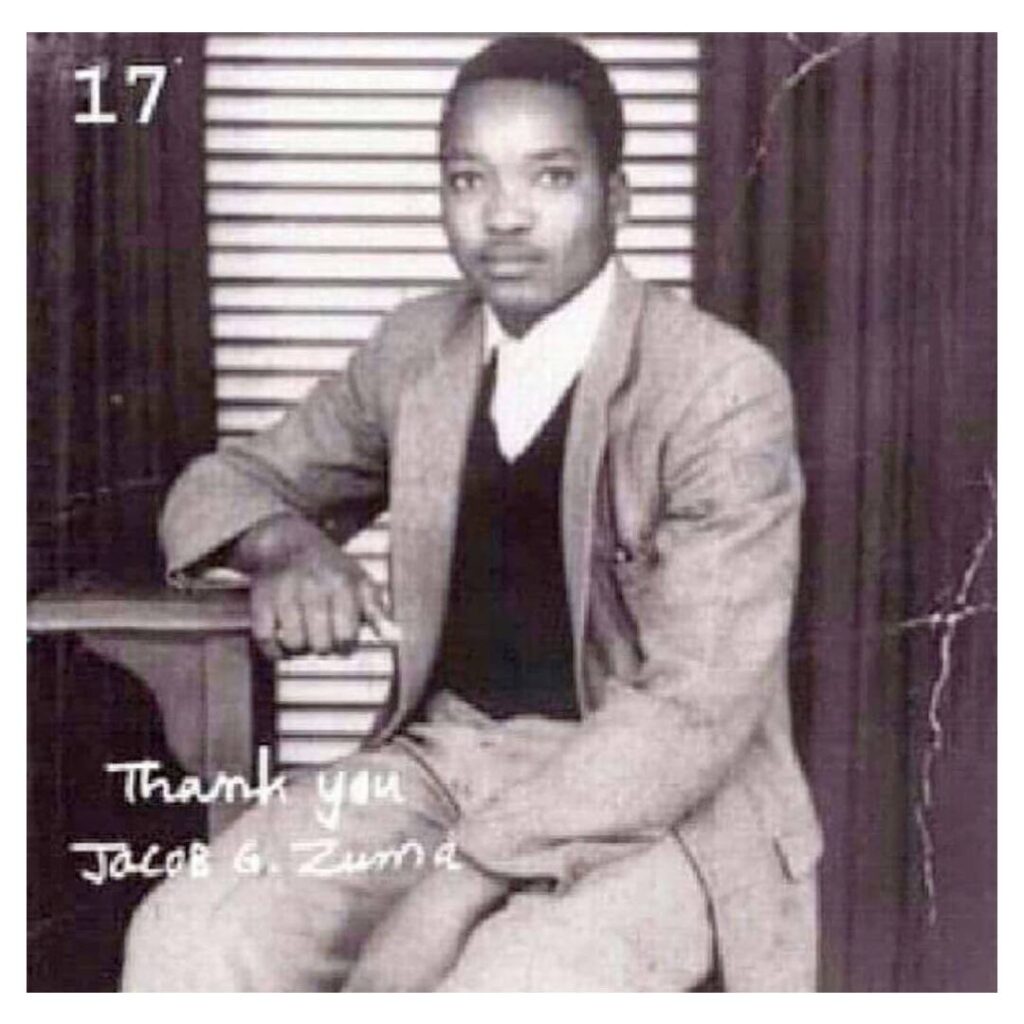Jacob Gedleyihlekisa Zuma, born on April 12, 1942, in KwaNxamalala, Nkandla, northern KwaZulu-Natal, was deeply influenced by his cousin Muntukabongwa Zuma, a WWII veteran and trade unionist. Engaging in ANC and SACTU in 1959, he actively participated in the Roaring Fifties’ anti-apartheid struggles. He recalls the era’s leaders like Walter Sisulu and Nelson Mandela and underwent political education under Moses Mabhida and Stephen Dlamini.
Early Life and Commitment to the Struggle.
From a young age, Zuma displayed an unwavering dedication to justice and equality. In 1959, he joined the ANC, marking the beginning of a lifelong commitment to the liberation of South Africa. His activism led him to join Umkhonto we Sizwe, the ANC’s armed wing, in 1962, taking a bold stand against the oppressive apartheid regime.


Imprisonment and Resilience
Zuma joined Umkhonto Wesizwe and was imprisoned on Robben Island from 1963 to 1973, where he furthered his political and general education. Zuma’s resolve was tested during his ten year sentenced on Robben Island. During his imprisonment, he developed strong bonds with fellow freedom fighters, including Nelson Mandela, and honed his leadership skills. His resilience during this period solidified his reputation as a steadfast advocate for liberation.
Leadership in Exile
After his release in 1973, Zuma continued his activism, playing a crucial role in rebuilding the ANC’s underground structures. In the late 1970s, he went into exile, working tirelessly in Mozambique and Swaziland to strengthen the ANC’s international support and internal cohesion. His strategic acumen and dedication earned him various leadership roles within the ANC.
Post Release
Post-release, he resumed anti-apartheid efforts, aiding ANC underground structures under Harry Gwala until 1975 when he left on leadership instructions after Gwala’s arrest. Zuma established The Jacob Zuma Reconstruction and Development Programme (RDP) Educational Trust and later The Jacob Zuma Foundation, dedicated to uplifting impoverished communities.
Post-Apartheid Contributions
With the dawn of democracy in 1994, Zuma emerged as a pivotal figure in shaping the new South Africa. He served as a Member of Parliament and later as Deputy President from 1999 to 2005. His tenure was marked by efforts to foster reconciliation and drive economic transformation.
Presidency and Economic Transformation
As Deputy President, Zuma mediated conflicts in the DRC and championed moral regeneration, rural development, and AIDS awareness.Elected ANC President in 2007, he led the party to victory in the 2009 elections. In 2009, Zuma became the President of South Africa, ushering in a period focused on socio-economic development and inclusivity. His administration prioritized expanding access to education and healthcare, improving infrastructure, and promoting economic empowerment for previously marginalized communities. Zuma’s leadership was characterized by a vision for a more equitable South Africa.
Successes
His presidency emphasized collaborative governance, resulting in the establishment of new government departments and ministries, including Performance Monitoring and Evaluation and the National Planning Commission. Under Zuma’s leadership, the National Development Plan Vision 2030 was developed, focusing on long-term development goals. South Africa also successful hosted the first World Cup in Africa under his term of office as the president. His administration prioritized economic development through the Presidential Infrastructure Coordinating Commission and successfully tackled HIV/AIDS, achieving milestones like halving mother-to-child transmission.
Re-Election and Continued Impact
Re-elected in 2014, Zuma’s commitment to his nation remained steadfast. He championed numerous initiatives aimed at reducing poverty and inequality. Despite facing challenges, his administration worked to address the complex socio-economic issues inherited from decades of apartheid.
Legacy of Service
Jacob Zuma’s legacy is one of enduring service to his country. His contributions to the anti-apartheid struggle and his efforts to transform South Africa’s socio-economic landscape have left an indelible mark. Zuma’s life story is a testament to the power of resilience, dedication, and unwavering commitment to justice and equality.
While his journey has not been without challenges, Jacob Zuma’s impact on South Africa’s history and his dedication to the betterment of his nation continue to inspire many. His story is a reminder of the profound change that committed leadership can achieve.
Trials and Imprisonment
Jacob Zuma’s journey through the South African justice system, culminating in his prison sentence, is a testament to his enduring commitment to the principles of democracy, accountability, and the rule of law. This chapter of his life highlights his resilience and dedication to facing challenges head-on, reinforcing the values he has long championed.
The Contempt of Court Case
A frivolous case was brought up in the Zondo Commission. President Jacob Zuma believed the Commissioner was conflicted and raised his objections after which he was sent to prison for contempt of court. Rooted in his deep-seated belief Standing firm in his convictions, he showed his unwavering commitment to his principles. President Jacob Zuma decided to hand himself over against the wishes of his own supporters who stood guard against such an injustice. That action showed the true humanity of his character as he was not willing to see bloodshed in his name. What followed thereafter was pandemonium in the province of KwaZulu-Natal which brought the province to its knees. Till this day, the remnants of that fateful period is testament to his boldness and his popularity.
Embracing Accountability
Zuma’s acceptance of the court’s decision to imprison him demonstrated his respect for the rule of law, a cornerstone of any democratic society. His willingness to face the consequences of his actions underscored a vital lesson in accountability, reflecting his belief that no one, not even a former president, is above the law. This act of compliance highlighted his dedication to upholding the integrity of South Africa’s judicial system.
Inspiring Resilience and Unity
Zuma’s imprisonment became a focal point for discussions on justice and reconciliation in South Africa. Despite the personal hardships he faced, his journey through the legal system inspired many to engage in meaningful dialogue about the nation’s democratic values and the importance of transparency and accountability in governance.
Advocacy for Legal Reforms
Throughout his legal challenges, Zuma remained a vocal advocate for legal reforms, emphasizing the need for a fair and impartial judicial process. His experiences brought attention to areas within the legal system that could benefit from review and improvement, fostering a broader conversation about justice and equality in South Africa.
A Symbol of Strength and Endurance
Jacob Zuma’s time in prison symbolized his enduring strength and resilience. His ability to face adversity with dignity and grace resonated with many South Africans, reinforcing his image as a steadfast leader who confronts challenges head-on. Zuma’s incarceration period was not just a personal trial but a significant moment in the nation’s ongoing journey towards justice and reconciliation.
Reinforcing Democratic Values
By serving his sentence, Zuma reinforced the importance of adhering to democratic values and legal processes. His experience highlighted the critical role that accountability plays in maintaining the public’s trust in government institutions. Zuma’s actions served as a reminder that true leadership involves not only guiding a nation through its triumphs but also navigating it through its trials with integrity.
A Legacy of Commitment to Justice
Jacob Zuma’s prison sentence and his response to it have become an integral part of his legacy. They demonstrate his commitment to the principles of justice and accountability, showcasing his belief in the foundational values of democracy. His journey through the legal system serves as a powerful example of resilience and dedication to the rule of law, inspiring future generations to uphold these values in their own lives.
In summary, Jacob Zuma’s prison sentence is a significant chapter in his life, highlighting his dedication to democratic principles and the rule of law. His experience underscores the importance of accountability and resilience, reinforcing his legacy as a committed leader who faces challenges with unwavering strength.
